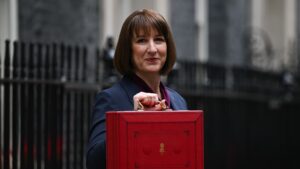Economic Ripples: How Rachel Reeves’ Budget is Affecting UK Businesses
As we turn our gaze to the UK economy, one name that continues to surface is Rachel Reeves, the UK Chancellor of the Exchequer. With her budget announcements stirring significant waves across various sectors, it’s crucial for investors and business owners alike to understand the implications of these fiscal policies.
Kingfisher’s Concerns: A Reflection of Broader Business Sentiments
Home improvement giant Kingfisher, the parent company of B&Q, recently echoed a sentiment that has become commonplace among British retailers: increased government costs and declining consumer sentiment are hindering their performance. In its annual earnings report, Kingfisher indicated that the financial decisions made in October had raised their operational costs, particularly impacting sales of big-ticket items.
This echoes a larger trend: as businesses brace for tighter margins and fluctuating consumer behavior, they are keenly awaiting Reeves’ upcoming Spring Statement. Scheduled for release at 12:30 PM London time on Wednesday, this statement is expected to outline key adjustments in spending and taxation.
Rising Employment Costs: The Elephant in the Room
One of the most contentious elements of the current budget is the uptick in national insurance contributions and the significant raise in the national living wage, now set to increase by 6.7% starting April 1. This is not just an abstract concern for large retailers; it has tangible implications for the operational capabilities of small businesses. For instance, Tesco anticipates an annual cost surge of up to £250 million attributed solely to these increased contributions. Meanwhile, JD Wetherspoon’s chairman, Tim Martin, warned that the changes could cost each of his pubs an additional £1,500 a week!
The impact of these rising costs could lead some businesses to reconsider their staffing strategies. As Regis Schultz, CEO of JD Sports, pointed out, the pressure could encourage firms to decrease workforce hours or even reduce employee count—moves that could have lasting negative repercussions on the economy.
Consumer Sentiment and Economic Stagnation
As UK businesses grapple with rising costs and tightened consumer spending, the overarching economic backdrop remains one of sluggish growth and inflationary pressures. According to reports from the Office for Budget Responsibility (OBR), the UK’s growth forecasts for 2025 are expected to be cut in half, compounding the uncertainty faced by businesses.
AB Foods, the parent company of Primark, underscored this sentiment, suggesting that the recent budget policies have contributed to broader consumer hesitancy. Their Finance Director Eoin Tonge noted that a climate of "shock and fear" is driving consumers to scale back their spending, a trend echoed by other retail chains like Frasers Group.
Call for Change: Business Leaders Speak Out
In light of his criticisms, the British Retail Consortium has implored the government to "inject confidence into the economy." They argue that the upcoming tax and wage increases could generate an additional £5 billion in costs for retailers, which would inevitably lead to higher prices for consumers.
Louise Hellem from the Confederation of British Industry (CBI) emphasized the need for strategic measures that prioritize business needs, like pledging not to hike the business tax burden any further during this parliamentary term. Such commitments could signal to businesses that the government is aware of their challenges and is willing to craft policies that foster a more favorable economic environment.
What Lies Ahead?
As Rachel Reeves prepares to address Parliament again, the spotlight remains firmly on cost management over tax hikes. Goldman Sachs’ Chief Equity Strategist, Peter Oppenheimer, acknowledged that concerns surrounding both consumer and business confidence might steer the Chancellor towards more fiscally conservative measures this week.
At Extreme Investor Network, we understand the complex dynamics currently affecting the UK economy, and we’re committed to keeping our community of investors informed. Whether you’re navigating the challenges of inflation, consumer behavior, or how government policies affect your investments, staying updated is crucial. We invite you to engage with us as we dissect the implications of these economic developments and what they mean for the future of investing in the UK.
By staying informed and ready to adapt your investment strategies, you can navigate these turbulent waters effectively. Join our community at Extreme Investor Network for further insights into the evolving economic landscape—because when it comes to investment, knowledge is your greatest asset.

